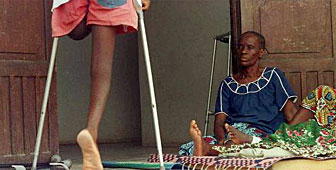Sudanese rebels sign up to landmine ban

The battle against the use of anti-personnel mines has taken a big step forward with the signing in Geneva by southern Sudanese rebels of a commitment to renounce the use of the weapons.
The signing of the Deed of Commitment by the Sudan People’s Liberation Movement (SPLM) was one of the biggest successes so far for the Geneva Call, a Swiss non-governmental organisation dedicated to including armed opposition movements in the process to ban landmines.
It is also a potentially important step for the millions of civilians at risk from mines in rebel-held areas in southern Sudan.
“The use of landmines in Sudan serves little practical military value, and it’s
time we put a stop to their use,” said Nhial Deng Nhial, president of the SPLM’s external relations commission, who signed the document on behalf of the movement’s leader, John Garang.
Garang had been due to fly to Geneva last week, but was unable to do so because his bodyguards, without whom he refuses to travel, were prevented from flying while armed.
The SPLM is the third “non-state actor” (NSA) to make such a commitment, after two rebel groups from the Philippines.
“It’s important for these groups to have a mechanism whereby they can stand up before the international community and state that they are prepared to respect certain humanitarian principles,” says Elisabeth Reusse-Decrey, president of the Geneva Call.
Part of solution
The Geneva Call was born out of the realisation that it was impossible to achieve a ban on landmines unless rebel groups were party to the process. Opposition forces use landmines, but they cannot be party to international treaties, so the Geneva-based NGO has assumed the role of depository in a new international mechanism to include them.
“Most conflicts today are internal. NSAs are part of the problem. They have to be part of the solution,” Reusse-Decrey told swissinfo.
“The Geneva Call would like to be to the NSAs what the Mine Ban Treaty is to governments,” she added. Some 30 non-state armies around the world are believed to use landmines, and many more, like the SPLM, control heavily mined areas. Humanitarian access to such regions is often very limited, if not impossible.
Under its Deed of Commitment, the SPLM agrees to ban the use, production, stockpiling and transfer of antipersonnel mines, facilitate mine clearance and destruction in areas under its control and allow monitoring and inspection by independent experts.
These experts include organisations like the Swiss Federation for De-mining and the International Committee of the Red Cross.
Pressure on governments
Nhial said de-mining and verification operations by local and international bodies were already underway in southern Sudan, but he believed that signing up to the Geneva Call would put these activities on a more formal footing.
He said the SPLM’s continued commitment to renouncing landmines was not linked in any way to the behaviour of the government. But both he and Reusse-Decrey said they hoped the SPLM’s decision would put pressure on the government in Khartoum to ratify the Ottawa Treaty banning the use of antipersonnel mines.
A number of governments that have signed, but not ratified, the treaty have continued to produce and deploy anti-personnel mines on the grounds that the rebel forces opposing them were continuing to use them.
The Geneva Call believes that more non-state actors could sign deeds of commitment on renouncing landmine use by the end of the year. Among the groups with which it is in advanced discussions are Kurdish rebels from northern Iraq, northern Iran and eastern Turkey, as well as opposition forces from Colombia, Sri Lanka and Western Sahara.
“It’s not just a question of signing a piece of paper. Everything has to be prepared very carefully,” Reusse-Decrey says.
by Roy Probert

In compliance with the JTI standards
More: SWI swissinfo.ch certified by the Journalism Trust Initiative
You can find an overview of ongoing debates with our journalists here. Please join us!
If you want to start a conversation about a topic raised in this article or want to report factual errors, email us at english@swissinfo.ch.